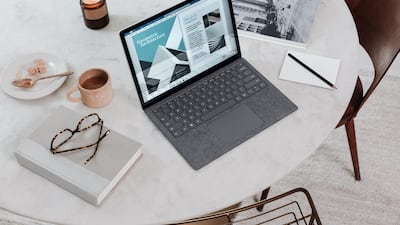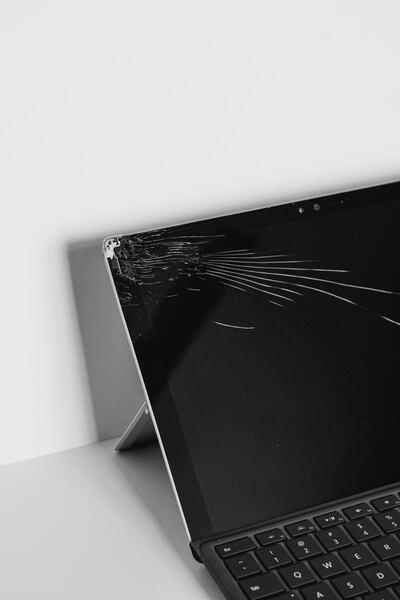The laptop computer has surely been the workhorse of the Covid-19 pandemic.
As the virus began to spread in the first half of 2020 and millions of people began to work or study from home, they enabled us to attend classes, write papers, meet deadlines and hold meetings with colleagues.
The gadget also became indispensable for lightening the mood, whether maintaining contact with friends and family via Zoom or Skype, streaming more music and video than ever before, or helping us escape the harsh realities of everyday life through online games.
Day in, day out, laptops suddenly had a lot more work to do – and that intensive year of sustained use certainly took its toll.
Insurance companies around the world have reported marked increases in claims for accidental damage of laptops, with liquid spillages the most common. Admiral, for example, reported a 31 per cent rise in claims for damaged laptops between March 2020 and March 2021, compared with the year before.
But, even setting aside the machines nuked by fizzy drinks or hot tea, there has been a huge amount of general wear and tear.
Pre-Covid, laptops were valued in terms of their portability: size, weight and battery life. If we could easily pop them into a bag and take them on our travels, we were happy.
But, with travelling curtailed, laptops turned out to be neither big nor sturdy enough. Smaller machines with smaller screens hampered people’s productivity and creativity, while the slender-form factors which had once been so convenient began to buckle under the physical strain.
The average lifespan of a mid-range laptop is, in normal times, around three years, according to experts and myriad tech websites. Judging by the state of our machines a few months into a global pandemic, that average would appear to be declining.
But laptops don’t have to die before their time. We’ve become used to treating them negligently, despite their substantial cost, and showing them a little more love can prolong their lifespan.
Here are eight tips that laptop repair specialists persistently remind us of, but we still frequently forget.
1. Keep them away from food and drink
More often than not, a glass of water dumped straight on a laptop keyboard spells its end. And yet we still persist in placing vessels of liquid mere inches away from our machines. Food crumbs may not pose so much of a hazard in the short term, but cumulatively they can still do damage to mice and keyboards. The simple solution: don’t eat and drink around your laptop.
2. Try not to let them run so hot
When you hear the laptop fan spin into gear, it’s desperately trying to cool itself. Computer processors emit enormous amounts of heat, and that heat needs to escape. Our habit of using laptops in bed, on pillows or cushions, or even on our laps, can block ventilation holes and put the machine under unnecessary stress. Similarly, it is unwise to leave them sitting in sunlight for long periods.
3. Give them a much-needed clean
The dust and dirt that collects in the machine can also push up the temperature of the laptop, forcing it to work harder and reducing its lifespan. A can of compressed air can remove much of the dust – from keyboards, ventilator holes, speakers, hinges and ports – without damaging the components within.
4. Don’t make it work harder than it needs to
Some applications, particularly games, have settings that allow you to moderate the amount of stress being put on the computer processor, and it can be worth bringing them down a notch or two. Having dozens of browser tabs open unnecessarily will also make the fan spin up; close them when you no longer need them.
5. Handle them more carefully
Flinging the laptop on to the sofa when you’ve finished a particularly onerous task might seem low risk, but unnecessary knocks can do damage. Keeping them away from pets and children, not leaving them balanced on the edge of tables and desks, keeping them out of dusty environments and not picking them up by the screen can all help them grow old a little more gracefully.
6. Be kind to the battery
No battery will last for ever. Some experts argue that leaving a laptop plugged in all the time will damage the battery, but there’s no clear-cut answer on this. Dell, for example, says it’s not a problem, but Asus says that it is. Mixing it up – sometimes using battery power, sometimes on AC – would seem to be a good idea.
7. Keep the laptop updated
Remote updates to system software can keep your machine protected from malware. These patches are generally only applied after you’ve restarted the laptop, so try to remember to shut it down properly from time to time, rather than just closing the lid and reopening it when you need it.
8. Upgrade components when (and if) you can
Apple machines are notoriously difficult to upgrade, but many laptops can be given a new lease of life by replacing a hard disk with an SSD, getting a new battery or even replacing the hinge on the screen. It can make them feel as good as new.
If, after all that, your laptop still doesn’t feel sufficiently hardy to deal with all this Covid-era manhandling, there are machines built to withstand sustained knocks and bumps, including Panasonic’s Toughbook and Dell’s Rugged ranges.
They may not win any marks for elegance, but hey – at least they may still be intact when the pandemic is over.
If you go
The flights
Emirates and Etihad fly direct to Nairobi, with fares starting from Dh1,695. The resort can be reached from Nairobi via a 35-minute flight from Wilson Airport or Jomo Kenyatta International Airport, or by road, which takes at least three hours.
The rooms
Rooms at Fairmont Mount Kenya range from Dh1,870 per night for a deluxe room to Dh11,000 per night for the William Holden Cottage.
Desert Warrior
Starring: Anthony Mackie, Aiysha Hart, Ben Kingsley
Director: Rupert Wyatt
Rating: 3/5
ESSENTIALS
The flights
Emirates, Etihad and Swiss fly direct from the UAE to Zurich from Dh2,855 return, including taxes.
The chalet
Chalet N is currently open in winter only, between now and April 21. During the ski season, starting on December 11, a week’s rental costs from €210,000 (Dh898,431) per week for the whole property, which has 22 beds in total, across six suites, three double rooms and a children’s suite. The price includes all scheduled meals, a week’s ski pass, Wi-Fi, parking, transfers between Munich, Innsbruck or Zurich airports and one 50-minute massage per person. Private ski lessons cost from €360 (Dh1,541) per day. Halal food is available on request.
MATCH INFO
Norwich 0
Watford 2 (Deulofeu 2', Gray 52')
Red card: Christian Kabasele (WatforD)
Dr Afridi's warning signs of digital addiction
Spending an excessive amount of time on the phone.
Neglecting personal, social, or academic responsibilities.
Losing interest in other activities or hobbies that were once enjoyed.
Having withdrawal symptoms like feeling anxious, restless, or upset when the technology is not available.
Experiencing sleep disturbances or changes in sleep patterns.
What are the guidelines?
Under 18 months: Avoid screen time altogether, except for video chatting with family.
Aged 18-24 months: If screens are introduced, it should be high-quality content watched with a caregiver to help the child understand what they are seeing.
Aged 2-5 years: Limit to one-hour per day of high-quality programming, with co-viewing whenever possible.
Aged 6-12 years: Set consistent limits on screen time to ensure it does not interfere with sleep, physical activity, or social interactions.
Teenagers: Encourage a balanced approach – screens should not replace sleep, exercise, or face-to-face socialisation.
Source: American Paediatric Association
Company%20profile
%3Cp%3E%3Cstrong%3ECompany%20name%3A%3C%2Fstrong%3E%20Fasset%0D%3Cbr%3E%3Cstrong%3EStarted%3A%20%3C%2Fstrong%3E2019%0D%3Cbr%3E%3Cstrong%3EFounders%3A%3C%2Fstrong%3E%20Mohammad%20Raafi%20Hossain%2C%20Daniel%20Ahmed%0D%3Cbr%3E%3Cstrong%3EBased%3A%3C%2Fstrong%3E%20Dubai%0D%3Cbr%3E%3Cstrong%3ESector%3A%20%3C%2Fstrong%3EFinTech%0D%3Cbr%3E%3Cstrong%3EInitial%20investment%3A%3C%2Fstrong%3E%20%242.45%20million%0D%3Cbr%3E%3Cstrong%3ECurrent%20number%20of%20staff%3A%3C%2Fstrong%3E%2086%0D%3Cbr%3E%3Cstrong%3EInvestment%20stage%3A%3C%2Fstrong%3E%20Pre-series%20B%0D%3Cbr%3E%3Cstrong%3EInvestors%3A%3C%2Fstrong%3E%20Investcorp%2C%20Liberty%20City%20Ventures%2C%20Fatima%20Gobi%20Ventures%2C%20Primal%20Capital%2C%20Wealthwell%20Ventures%2C%20FHS%20Capital%2C%20VN2%20Capital%2C%20local%20family%20offices%3C%2Fp%3E%0A
Abu Dhabi World Pro 2019 remaining schedule:
Wednesday April 24: Abu Dhabi World Professional Jiu-Jitsu Championship, 11am-6pm
Thursday April 25: Abu Dhabi World Professional Jiu-Jitsu Championship, 11am-5pm
Friday April 26: Finals, 3-6pm
Saturday April 27: Awards ceremony, 4pm and 8pm
COMPANY%20PROFILE
%3Cp%3E%3Cstrong%3EName%3A%20%3C%2Fstrong%3EEjari%3Cbr%3E%3Cstrong%3EBased%3A%20%3C%2Fstrong%3ERiyadh%2C%20Saudi%20Arabia%3Cbr%3E%3Cstrong%3EFounders%3A%20%3C%2Fstrong%3EYazeed%20Al%20Shamsi%2C%20Fahad%20Albedah%2C%20Mohammed%20Alkhelewy%20and%20Khalid%20Almunif%3Cbr%3E%3Cstrong%3ESector%3A%20%3C%2Fstrong%3EPropTech%3Cbr%3E%3Cstrong%3ETotal%20funding%3A%20%3C%2Fstrong%3E%241%20million%3Cbr%3E%3Cstrong%3EInvestors%3A%20%3C%2Fstrong%3ESanabil%20500%20Mena%2C%20Hambro%20Perks'%20Oryx%20Fund%20and%20angel%20investors%3Cbr%3E%3Cstrong%3ENumber%20of%20employees%3A%20%3C%2Fstrong%3E8%3C%2Fp%3E%0A
The lowdown
Bohemian Rhapsody
Director: Bryan Singer
Starring: Rami Malek, Lucy Boynton, Gwilym Lee
Rating: 3/5
Timeline
2012-2015
The company offers payments/bribes to win key contracts in the Middle East
May 2017
The UK SFO officially opens investigation into Petrofac’s use of agents, corruption, and potential bribery to secure contracts
September 2021
Petrofac pleads guilty to seven counts of failing to prevent bribery under the UK Bribery Act
October 2021
Court fines Petrofac £77 million for bribery. Former executive receives a two-year suspended sentence
December 2024
Petrofac enters into comprehensive restructuring to strengthen the financial position of the group
May 2025
The High Court of England and Wales approves the company’s restructuring plan
July 2025
The Court of Appeal issues a judgment challenging parts of the restructuring plan
August 2025
Petrofac issues a business update to execute the restructuring and confirms it will appeal the Court of Appeal decision
October 2025
Petrofac loses a major TenneT offshore wind contract worth €13 billion. Holding company files for administration in the UK. Petrofac delisted from the London Stock Exchange
November 2025
180 Petrofac employees laid off in the UAE
The%20specs
%3Cp%3E%3Cstrong%3EEngine%3A%20%3C%2Fstrong%3E2.0-litre%204-cyl%20turbo%3Cbr%3E%3Cstrong%3EPower%3A%20%3C%2Fstrong%3E190hp%20at%205%2C600rpm%3Cbr%3E%3Cstrong%3ETorque%3A%20%3C%2Fstrong%3E320Nm%20at%201%2C500-4%2C000rpm%3Cbr%3E%3Cstrong%3ETransmission%3A%20%3C%2Fstrong%3E7-speed%20dual-clutch%20auto%3Cbr%3E%3Cstrong%3EFuel%20consumption%3A%20%3C%2Fstrong%3E10.9L%2F100km%3Cbr%3E%3Cstrong%3EPrice%3A%20%3C%2Fstrong%3EFrom%20Dh119%2C900%3Cbr%3E%3Cstrong%3EOn%20sale%3A%20%3C%2Fstrong%3ENow%3C%2Fp%3E%0A
RESULTS
5pm: Maiden (PA) Dh80,000 1,400m
Winner: JAP Almahfuz, Fernando Jara (jockey), Irfan Ellahi (trainer).
5.30pm: Handicap (PA) Dh90,000 1,400m
Winner: AF Momtaz, Antonio Fresu, Musabah Al Muhairi.
6pm: Handicap (TB) Dh100,000 1,400m
Winner: Yaalail, Fernando Jara, Ali Rashid Al Raihe.
6.30pm: Abu Dhabi Championship Listed (PA) Dh180,000 1,600m
Winner: Ihtesham, Szczepan Mazur, Ibrahim Al Hadhrami.
7pm: Wathba Stallions Cup Handicap (PA) Dh70,000 1,600m
Winner: Dahess D’Arabie, Fernando Jara, Helal Al Alawi.
7.30pm: Maiden (PA) Dh80,000 2.200m
Winner: Ezz Al Rawasi, Connor Beasley, Helal Al Alawi.
What is hepatitis?
Hepatitis is an inflammation of the liver, which can lead to fibrosis (scarring), cirrhosis or liver cancer.
There are 5 main hepatitis viruses, referred to as types A, B, C, D and E.
Hepatitis C is mostly transmitted through exposure to infective blood. This can occur through blood transfusions, contaminated injections during medical procedures, and through injecting drugs. Sexual transmission is also possible, but is much less common.
People infected with hepatitis C experience few or no symptoms, meaning they can live with the virus for years without being diagnosed. This delay in treatment can increase the risk of significant liver damage.
There are an estimated 170 million carriers of Hepatitis C around the world.
The virus causes approximately 399,000 fatalities each year worldwide, according to WHO.
Sly%20Cooper%20and%20the%20Thievius%20Raccoonus
%3Cp%3E%3Cstrong%3EDeveloper%3A%3C%2Fstrong%3E%20Sucker%20Punch%20Productions%3Cbr%3E%3Cstrong%3EPublisher%3A%3C%2Fstrong%3E%20Sony%20Computer%20Entertainment%3Cbr%3E%3Cstrong%3EConsole%3A%3C%2Fstrong%3E%20PlayStation%202%20to%205%3Cbr%3E%3Cstrong%3ERating%3A%3C%2Fstrong%3E%205%2F5%3C%2Fp%3E%0A
The specs
Engine: 4.0-litre V8 twin-turbocharged and three electric motors
Power: Combined output 920hp
Torque: 730Nm at 4,000-7,000rpm
Transmission: 8-speed dual-clutch automatic
Fuel consumption: 11.2L/100km
On sale: Now, deliveries expected later in 2025
Price: expected to start at Dh1,432,000
SANCTIONED
- Kirill Shamalov, Russia's youngest billionaire and previously married to Putin's daughter Katarina
- Petr Fradkov, head of recently sanctioned Promsvyazbank and son of former head of Russian Foreign Intelligence, the FSB.
- Denis Bortnikov, Deputy President of Russia's largest bank VTB. He is the son of Alexander Bortnikov, head of the FSB which was responsible for the poisoning of political activist Alexey Navalny in August 2020 with banned chemical agent novichok.
- Yury Slyusar, director of United Aircraft Corporation, a major aircraft manufacturer for the Russian military.
- Elena Aleksandrovna Georgieva, chair of the board of Novikombank, a state-owned defence conglomerate.
MORE ON IRAN'S PROXY WARS



